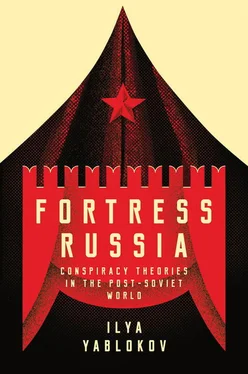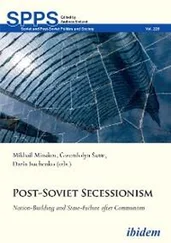The notion that ‘the Russian people’ were a united community loyal to the leader was also conveyed in reports about the so-called Antimaidan movement. The ideological approach of this recently created movement, led by Nikolai Starikov, was solely based on anti-Western conspiracy theories. The people attending the Day of Russia celebration and the Antimaidan rallies were depicted by the state-aligned media as the ‘real’ Russian people loyal to Putin. One Vesti Nedeli report stated that while ten thousand people had been expected to attend the rally, fifty thousand people turned up, representing seventy-two regions, which was almost all of Russia (Kiselev and Skabeeva, 2015a). A report on Channel One also emphasized the number of people who came both from the Russian regions and from Ukraine (Batukhov, 2015). The unifying mantra at these marches was resistance to Western attempts to undermine Russian statehood and Putin. The visual depictions of the people served to demonstrate the overwhelming support for the authorities in the face of the biggest military clash with the West in the post-Soviet era. Thus, the ‘Antimaidan’ march created the image of ‘truly patriotic Russians’, the proactive majority of the ‘people’ ready to defend the country from any ‘colour revolutions’ and American conspiracy. Starikov drew attention to the shadow of American intelligence which was cast over the events in Kyiv and insisted that Euromaidan represented the threat to overthrow Russia and instigate revolution. In Starikov’s view, the pro-state rallies demonstrated the capability of Russian society to protect itself from foreign invasion and represent real opposition to the government; he contrasted them with the ‘fifth column’ of Russia haters whose goal was to destroy Russia rather than improve the lives of its people.
In the same conspiratorial fashion, Western criticism of Russia’s actions in Ukraine, and of Putin personally, was treated as part of the Western war against Russia. This was particularly clear in the report broadcast on 31 January 2016 by Vesti Nedeli . The BBC documentary ‘Putin’s Secret Reaches’, which argued that Putin has substantial financial assets, was taken as yet more proof that the Americans were behind the media attacks on Russia, and was used to justify further criticism of the Western media. Statements made by the US Treasury official Adam Szubin in a film about supposed corruption on the part of the Russian president, were taken as evidence of the White House’s plan to cause unrest in Russia before the parliamentary elections in September 2016. The presenter claimed that the US official’s accusations were not grounded in any evidence, but were simply a way of tarnishing Putin’s reputation, which would make it easier for the opposition to start a revolution. Again, this was likened to the situation in Ukraine in 2014 (Kiselev, 2016b). Resistance to the US-led New World Order has been adopted as the best means of strengthening Putin’s popularity across the world. Kiselev said of the media campaign to smear the presidential image:
Putin is like a bone lodged in their throat. He hampers their plans to start wars based on false allegations, the terms of peace in Iraq; hinders them from destroying countries, just as they did in Libya. Putin prevents the US placing the world under its control, because he doesn’t give up. (Kiselev, 2016b)
Traitors are in the Kremlin
In the harshest period of the conflict between Russia and Ukraine, in the autumn of 2014, the elite’s support of Russia’s Ukrainian policy, as well as its loyalty to Putin, were unexpectedly questioned by the most ardent authors of anti-Western conspiracy theories. The limited and largely covert involvement of Russian forces in eastern Ukraine triggered criticism on the part of those who wanted immediate annexation of the region, which would thereafter be called Novorossiia. The regions of eastern and southern Ukraine, which had been part of the Russian Empire, were seen by anti-Western Russian philosophers as a major battleground with the West (Laruelle, 2016b). The Kremlin used the idea of Novorossiia to justify both the federalization of Ukraine and Russia’s resistance to the Ukrainian authorities. Use of this term in mainstream Russian political and media discourse was to a large extent an instrument of propaganda, and it faded away after 2015 (O’Loughlin, Toal and Kolosov, 2017). All the same, for nationalists the idea of Novorossiia remained hugely important; for them it signified liberation from capitalism and the onset of a conservative revolution in Russia (Laruelle, 2016a). Some, such as Dugin, saw it as the start of the long-awaited ‘war of the continents’; for others, it represented the start of a new cold war (Akopov, 2014; Balmforth, 2014). Yet none of this was on the Kremlin’s agenda.
Active supporters of Novorossiia – most notably, Dugin, and Igor’ Strelkov, the notorious commander of pro-Russian rebels in the Donbass and Crimea – suggested that a ‘fifth column’ of pro-US supporters had been working in Putin’s government. Dugin extended this idea, introducing another term – the ‘sixth column’ – to draw a distinction between street opposition activists like Aleksei Navalny, and high-ranking bureaucrats in Putin’s cabinet who were secretly plotting against him and undermining his policies. Dugin claimed that the biggest threat from this cabal of pro-Western actors, which included top managers of state-run corporations, supposedly loyal oligarchs and ‘enlightened bureaucrats’, was that they would stop Putin from initiating anti-Western policies and revitalizing Russian identity. ‘[The sixth column] is invisible, cowardly, ignoble, self-confident; it is an integral element in the regime’s institutes, is well-organized, and closely follows the plan developed by the West’ (Dugin, 2014). Eventually, Dugin accused the ‘lunar Putin’ – the supposedly pro-Western version of the Russian leader – of exchanging the support for Novorossiia for the deal with the West. After that statement, he lost his chair at Moscow State University (Wilson, 2014, p.186).
A few months after the publication of Dugin’s article, Stelkov, who had just returned from the Donbass, accused the political establishment of undermining the rebels in eastern Ukraine. He claimed that the high-ranking bureaucrats responsible for the Kremlin’s foreign policy had put forward arguments for a peaceful solution to the Ukraine crisis. The Minsk Agreements aimed at settling the peace in the rebellious territories, and the failure to use the military in southern and eastern Ukraine, had made it possible for the West to deliver military forces and ammunition to Ukraine. In Strelkov’s opinion, the role of the ‘fifth column’ was to seize power and overthrow Putin in accordance with orders from the West, which threatened to confiscate the assets held by its members in Western banks if they did not comply (Strelkov, 2014). In December 2014 Strelkov named Surkov, who had been appointed by the Kremlin in 2014 to negotiate the terms of peace in Ukraine with European and US leaders, as one of the high-ranking bureaucrats working in consort with the West (Rosbalt, 2014).
The application of conspiracy theories by the Russian elite to the domestic situation demonstrates a number of interesting aspects about the country’s tangled politics. The criticisms levelled against Surkov and Putin show that the hard-line producers of anti-Western narratives, despite being part of the conservative elite and in some cases recruited by the Kremlin to support its policies, tried to spread, albeit unsuccessfully, negative ideas about the beliefs and activities of other elite members. Attempts on the part of Strelkov and Dugin to accuse Surkov and other liberal-minded members of Putin’s close circle of acting in the interests of the West is a sign of clashes within the Russian establishment.
Читать дальше
Конец ознакомительного отрывка
Купить книгу












